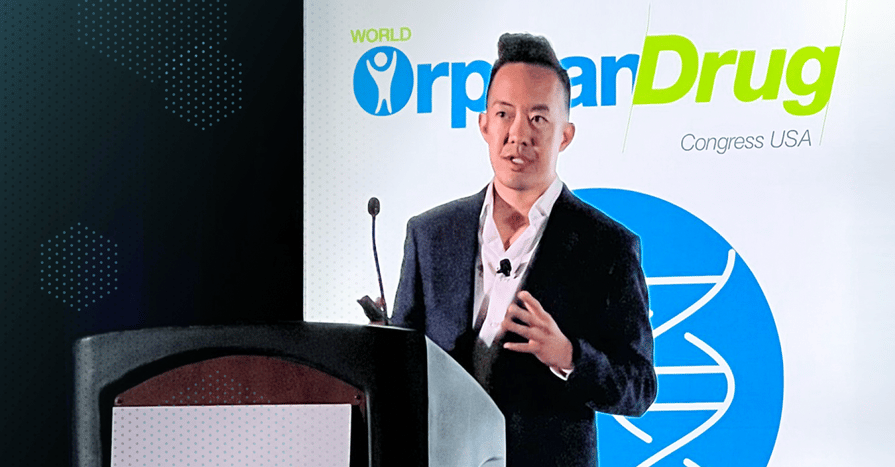Web Sun's Keynote at World Orphan Drug Congress: Top 3 Takeaways

Komodo Health was front and center at this year’s WODC to share how a full stack technology approach leveraging artificial intelligence and machine learning can improve minority representation for rare disease R&D.
We’ve long understood the potential for data and software to improve healthcare. Now, we've crossed a threshold into a new era of tech where this potential is actively being realized. That’s thanks largely to the proliferation of healthcare data that can finally be connected, synthesized, and pulled through into the latest advancements in software to answer our most complex clinical questions. One arena already benefiting from these advances is the rare disease space, and experts gathered to discuss recent advances at last month’s World Orphan Drug Congress in Boston.
The congress brought together over 1,700 attendees from more than 50 countries to share their work and brainstorm ways to advance therapy development and access for patients with rare diseases. Attendees represented stakeholders ranging from pharmaceutical and biotech leaders, to government and regulatory authorities, to patient advocacy groups, payers, and investors.
Web Sun, Komodo Health’s Co-Founder and President, gave a keynote speech at this year’s congress, to share how Komodo is supporting rare disease therapeutic development, clinical trial diversity, and impactful real-world evidence insight generation.
Here are the top three takeaways from Web's talk:
In his keynote, Web highlighted the unique challenges of orphan drug development, including small patient populations, missing codes, siloed data, low trial enrollment, high misdiagnosis rates, and obfuscated symptom patterns. He emphasized the need for well-linked high-fidelity data and advanced software and analytics to address orphan drug R&D pain points and offer deeper views into signals of disease and the nuances of patient journeys. Web shared how Komodo’s platform has already helped rare disease researchers identify non-obvious co-morbidities, other signals of disease, and patient journey patterns — insights that are helping to identify misdiagnosed and undiagnosed cases, and ameliorate the extended diagnostic odyssey experienced by so many rare disease patients. Software solutions, including Komodo’s platform, have the capacity to advance our approaches to orphan drug development quickly, by improving our epidemiological understanding of rare diseases, as well as product development, launch strategies, and performance tracking..png?width=900&name=BLOG%20Web%20Keynote%20Quotes_0819%20(1).png)
2. Achieving minority representation in clinical trials is essential, and has never been more achievable than it is today.
Web also stressed the need for these new approaches to address long standing gaps in minority representation in rare disease clinical trials. Real-world data, paired with the right technology, is driving more equitable research. From synthetic control arms to real-time alerting systems, typical clinical trial pain points are magnified in the orphan drug space, providing a unique opportunity for data-driven software to significantly improve racial and ethnic representation. Web highlighted work Komodo has done with our customers by applying unprecedented race and ethnicity insights to improve trial diversity, optimizing feasibility testing, site selection, and patient recruitment..png?width=897&name=BLOG%20Web%20Keynote%20Quotes_08192%20(1).png)
3. New technologies and collaborations are transforming the orphan drug space every day.
Web explained how the future of orphan drug development is being shaped every day as new technologies grow our capacity to garner insights and identify patients. The current high rate of change will only continue, as technical experts develop novel AI and ML approaches and as cultural shifts change the landscape — from telehealth, to healthcare consumerism, to biotracking. Collaboration is also playing an important role in driving change, Web said, as advocacy organizations partner with platforms like Komodo’s. These organizations are the on-the-ground leaders in improving patient experiences and quality of life, and have historically been responsible for driving many of the biggest advancements in their disease areas. However, these experts have typically relied on tiny datasets and sub-scale initiatives to connect patients and their data. Today, they are combining their hard-earned expertise with Komodo’s platform, to innovate and explore. As just one example, Komodo Health has partnered with 50+ rare disease patient advocacy groups via the Chan Zuckerberg Initiative, enabling them with the software and analytical firepower needed to improve time-to-diagnosis, close gaps in care, and accelerate research to deliver impact for those with rare diseases.
At Komodo Health, we're proud of the work we do to improve the lives of patients, and we’re proud to have clear examples of our leadership in paving the way to build next-gen software to support a new era of healthcare. For rare disease research and orphan drug development, it’s clear that the new technologies originating from these efforts are making a big impact. From improving our approaches to insight generation and increasing trial diversity to welcoming new forms of collaboration, we’re acting on a diversity of approaches and opportunities that will ultimately improve the lives of rare disease patients, which amount to 1 in 10 Americans. At Komodo, we’re dedicated to our mission and building tools supporting a new era of healthcare to reduce the global burden of disease.
Read about our work with 50+ rare disease advocacy groups through our partnership with the Chan Zuckerberg Initiative, or learn how Komodo Health’s RWE is Delivering Speed, Insights, and Value for Clinical Trials.
Read more about life as a Dragon in our Culture series and to learn more about Komodo, follow Komodo Health on Twitter, LinkedIn, or YouTube.





